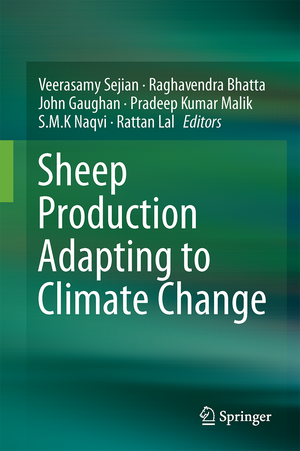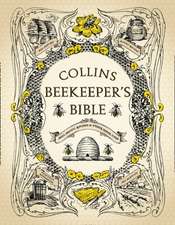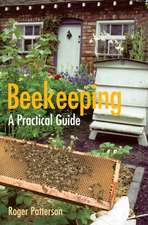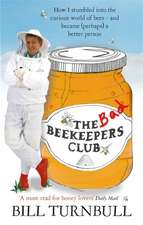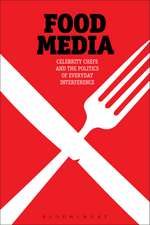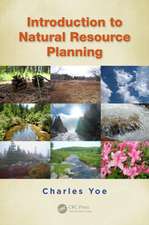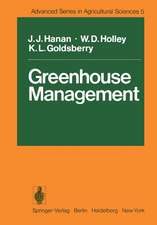Sheep Production Adapting to Climate Change
Editat de Veerasamy Sejian, Raghavendra Bhatta, John Gaughan, Pradeep Kumar Malik, S.M.K Naqvi, Rattan Lalen Limba Engleză Hardback – 2 iul 2017
The negative impacts of climate change are already being felt by all livestock species. Further, the mitigation and amelioration strategies that are applicable for one species may not hold true for another. As such, concerted research efforts are needed to identify species-specific strategies for mitigation and adaptation.
With that goal in mind, this book is the first of its kind to gather comprehensive information pertaining to the impact of climate change on various aspects of sheep production. It also sheds light on the role of sheep with regard to the global greenhouse gas pool. The book highlights the status quo of sheep production from climate change perspectives and projects the significance of adapting future sheep production to the challenges posed by climate change.
It addresses in detail the various adaptations, methane mitigation and amelioration strategies needed to sustain sheep production in the future. In addition, the book presents development plans and policies that will allow the sheep industry to cope with current climate changes and strategies that will lessen future impacts.
Bringing together essential information prepared by world-class researchers hailing from different agro-ecological zones, this book offers a unique resource for all researchers, teachers and students associated with sustaining the sheep production in the face of global change.
| Toate formatele și edițiile | Preț | Express |
|---|---|---|
| Paperback (1) | 1149.35 lei 38-44 zile | |
| Springer Nature Singapore – 12 dec 2018 | 1149.35 lei 38-44 zile | |
| Hardback (1) | 1164.38 lei 38-44 zile | |
| Springer Nature Singapore – 2 iul 2017 | 1164.38 lei 38-44 zile |
Preț: 1164.38 lei
Preț vechi: 1532.08 lei
-24% Nou
Puncte Express: 1747
Preț estimativ în valută:
222.83€ • 231.23$ • 186.25£
222.83€ • 231.23$ • 186.25£
Carte tipărită la comandă
Livrare economică 11-17 martie
Preluare comenzi: 021 569.72.76
Specificații
ISBN-13: 9789811047138
ISBN-10: 9811047138
Pagini: 441
Ilustrații: XXII, 441 p. 50 illus., 40 illus. in color.
Dimensiuni: 155 x 235 mm
Greutate: 0 kg
Ediția:1st ed. 2017
Editura: Springer Nature Singapore
Colecția Springer
Locul publicării:Singapore, Singapore
ISBN-10: 9811047138
Pagini: 441
Ilustrații: XXII, 441 p. 50 illus., 40 illus. in color.
Dimensiuni: 155 x 235 mm
Greutate: 0 kg
Ediția:1st ed. 2017
Editura: Springer Nature Singapore
Colecția Springer
Locul publicării:Singapore, Singapore
Cuprins
Chapter 1. Introduction to Sheep Production Adapting to Climate Change.- Chapter 2. Climate Change Impact on Sheep Production: Growth, Milk, Wool and Meat.- Chapter 3. Climate Change Impact on Sheep Reproduction.- Chapter 4. Climate Change impact on Immune Response in Sheep.- Chapter 5. Adaptive Mechanisms of Sheep to Climate Change.- Chapter 6. Sheep Genetic Diversity and Breed Differences for Climate Change Adaptation.- Chapter 7. Climate Changes, Water Use and Survival During Severe Water Deprivation.- Chapter 8. Projected Impacts of Climate Changes and Sustainability of Sheep Production Systems.- Chapter 9. Impact of Climate Change on Sheep Disease Occurrences and its Management.- Chapter 10. Enteric Methane Emission in Sheep: Process Description and Factors Influencing Production.- Chapter 11. Alteration in Rumen Functions and Diet Digestibility During Heat Stress in Sheep.- Chapter 12. Methane Estimation Methodologies in Sheep.- Chapter 13. Enteric Methane Emission and Reduction Strategies in Sheep.- Chapter 14. Measurement of Severity of Heat Stress in Sheep.- Chapter 15. Biological Markers for Climate Change: Impact in Sheep.- Chapter 16. Ideal Housing Systems for Sheep to Cope with Climate Change.- Chapter 17. Management Strategies to Reduce Heat Stress in Sheep.- Chapter 18. Nutritional Strategies to Alleviate Heat stress in Sheep.- Chapter 19. Significance of Body Condition Scoring System to Optimize sheep Production.- Chapter 20. Adaptation Strategies to Counter Climate Change Impact on Sheep.- Chapter 21. Sheep Production Adapting to Climate Change: Conclusions and Researchable Priorities.
Notă biografică
Dr Veerasamy Sejian, PhD., is Senior Scientist at ICAR-National Institute of Animal Nutrition and Physiology (NIANP), Bangalore, India. Dr Sejian is the team leader which established the concept of “Multiple stresses impacting small ruminant production in the changing climate scenario”. His current research is focused on developing agro-ecological zone specific thermo-tolerant breed. Dr Sejian has published 57 international and 19 national peer reviewed research articles, 62 book chapters, 130 invited/lead papers and 86 conference papers. Further, Dr Sejian has published two international Springer books. Recently, Dr Sejian was bestowed with Endeavour Research Fellowship by the Australian Government. Further, ICAR has bestowed him with the prestigious Lal Bahadur Shastri Outstanding Young Scientist Award.
Dr Raghavendra Bhatta, PhD., is the Director at the ICAR-National Institute of Animal Nutrition and Physiology (NIANP), Bangalore, India. Dr Bhatta and his team for the first time have developed the all India district wise inventory on enteric methane emission. Dr Bhatta has published 63 research papers in journals of high impact factor, 25 book chapters and 83 conference papers. He also edited a book on Livestock production and climate change published by CABI. He was the recipient of prestigious JSPS Post-doctorate Fellowship at NILGS, Japan. He has been recognized as an expert of the Technical Advisory Group (TAG) of the Food and Agricultural Organization of the United Nations (FAO).
Dr John Gaughan, PhD., is an Associate Professor in the School of Agriculture and Food Sciences at The University of Queensland, Gatton, Australia. He has authored or co-authored 11 book chapters, 34 refereed publications, 72 conference proceedings, and 20 research reports. He is recognized as a leader in cattle heat stress research in Australia and internationally. He is part of an international team which has recently developed new thermal stress indices for livestock and a heat stress risk assessment model for feedlot cattle. John is the Treasurer of the International Society of Biometeorology and is a member of the Editorial Advisory Board for the International Journal of Biometeorology.
Dr Pradeep Kumar Malik, PhD., is Senior Scientist (Animal Nutrition) at ICAR-National Institute of Animal Nutrition and Physiology, Bangalore, India. His present research focus includes the development of precise enteric methane emission inventory for different states of the country and also devising strategies for enteric methane amelioration using tanniferous phyto-sources. He has published many international and national research papers, chapters in highly reputed journal/books in the related field. Recently, he also edited a book on Livestock production and climate change published by CABI. He is also the recipient of prestigious Endeavour Research Fellowship of Australian Government and did post-doc at University of Queensland, Australia.
Dr S.M.K. Naqvi, PhD., is the Director at the ICAR-Central Sheep and Wool Research Institute, Rajasthan, India. His current research focus is on sheep adaptation, stress physiology and reproductive biotechnology. Dr Naqvi has published 110 research papers in referred National and International journals, 9 book chapters and 50 Conference Proceedings. He has also filed four patents. His work got due recognition and published in the Limca Book of Records (India). For his outstanding contribution in the field of sheep production, Dr Naqvi has been recognized as the fellow of several academies and societies. He is also currently serving as the President for Indian Society for Sheep and Goat Production and Utilization.
Dr Rattan Lal, Ph.D., is a Distinguished University Professor of Soil Science and Director of the Carbon Management and Sequestration Center, The Ohio State University, and an Adjunct Professor of University of Iceland. He received B.S. from Punjab Agricultural University, Ludhiana; M.S. from IARI, New Delhi and Ph.D. from the Ohio State University. He served as Sr. Research Fellow with the University of Sydney, Australia (1968-69), Soil Physicist at IITA, Ibadan, Nigeria (1970-87), and Professor of Soil Science at OSU (1987-to date). He has authored/co-authored 834 refereed journal articles and 477 book chapters, has written 19 and edited/co-edited 66 books. He is also included in the Thomson Reuters 2014, 2015 and 2016 list of the most cited scientists.
Dr Raghavendra Bhatta, PhD., is the Director at the ICAR-National Institute of Animal Nutrition and Physiology (NIANP), Bangalore, India. Dr Bhatta and his team for the first time have developed the all India district wise inventory on enteric methane emission. Dr Bhatta has published 63 research papers in journals of high impact factor, 25 book chapters and 83 conference papers. He also edited a book on Livestock production and climate change published by CABI. He was the recipient of prestigious JSPS Post-doctorate Fellowship at NILGS, Japan. He has been recognized as an expert of the Technical Advisory Group (TAG) of the Food and Agricultural Organization of the United Nations (FAO).
Dr John Gaughan, PhD., is an Associate Professor in the School of Agriculture and Food Sciences at The University of Queensland, Gatton, Australia. He has authored or co-authored 11 book chapters, 34 refereed publications, 72 conference proceedings, and 20 research reports. He is recognized as a leader in cattle heat stress research in Australia and internationally. He is part of an international team which has recently developed new thermal stress indices for livestock and a heat stress risk assessment model for feedlot cattle. John is the Treasurer of the International Society of Biometeorology and is a member of the Editorial Advisory Board for the International Journal of Biometeorology.
Dr Pradeep Kumar Malik, PhD., is Senior Scientist (Animal Nutrition) at ICAR-National Institute of Animal Nutrition and Physiology, Bangalore, India. His present research focus includes the development of precise enteric methane emission inventory for different states of the country and also devising strategies for enteric methane amelioration using tanniferous phyto-sources. He has published many international and national research papers, chapters in highly reputed journal/books in the related field. Recently, he also edited a book on Livestock production and climate change published by CABI. He is also the recipient of prestigious Endeavour Research Fellowship of Australian Government and did post-doc at University of Queensland, Australia.
Dr S.M.K. Naqvi, PhD., is the Director at the ICAR-Central Sheep and Wool Research Institute, Rajasthan, India. His current research focus is on sheep adaptation, stress physiology and reproductive biotechnology. Dr Naqvi has published 110 research papers in referred National and International journals, 9 book chapters and 50 Conference Proceedings. He has also filed four patents. His work got due recognition and published in the Limca Book of Records (India). For his outstanding contribution in the field of sheep production, Dr Naqvi has been recognized as the fellow of several academies and societies. He is also currently serving as the President for Indian Society for Sheep and Goat Production and Utilization.
Dr Rattan Lal, Ph.D., is a Distinguished University Professor of Soil Science and Director of the Carbon Management and Sequestration Center, The Ohio State University, and an Adjunct Professor of University of Iceland. He received B.S. from Punjab Agricultural University, Ludhiana; M.S. from IARI, New Delhi and Ph.D. from the Ohio State University. He served as Sr. Research Fellow with the University of Sydney, Australia (1968-69), Soil Physicist at IITA, Ibadan, Nigeria (1970-87), and Professor of Soil Science at OSU (1987-to date). He has authored/co-authored 834 refereed journal articles and 477 book chapters, has written 19 and edited/co-edited 66 books. He is also included in the Thomson Reuters 2014, 2015 and 2016 list of the most cited scientists.
Textul de pe ultima copertă
This book presents a compilation of the latest findings from reputed researchers around the globe, covering in detail climate change and its effects on sheep production. In the current global climate change scenario, information related to its impact on livestock agriculture is lacking.
The negative impacts of climate change are already being felt by all livestock species. Further, the mitigation and amelioration strategies that are applicable for one species may not hold true for another. As such, concerted research efforts are needed to identify species-specific strategies for mitigation and adaptation.
With that goal in mind, this book is the first of its kind to gather comprehensive information pertaining to the impact of climate change on various aspects of sheep production. It also sheds light on the role of sheep with regard to the global greenhouse gas pool. The book highlights the status quo of sheep production from climate change perspectives and projects the significance of adapting future sheep production to the challenges posed by climate change.
It addresses in detail the various adaptations, methane mitigation and amelioration strategies needed to sustain sheep production in the future. In addition, the book presents development plans and policies that will allow the sheep industry to cope with current climate changes and strategies that will lessen future impacts.
Bringing together essential information prepared by world-class researchers hailing from different agro-ecological zones, this book offers a unique resource for all researchers, teachers and students associated with sustaining the sheep production in the face of global change.
The negative impacts of climate change are already being felt by all livestock species. Further, the mitigation and amelioration strategies that are applicable for one species may not hold true for another. As such, concerted research efforts are needed to identify species-specific strategies for mitigation and adaptation.
With that goal in mind, this book is the first of its kind to gather comprehensive information pertaining to the impact of climate change on various aspects of sheep production. It also sheds light on the role of sheep with regard to the global greenhouse gas pool. The book highlights the status quo of sheep production from climate change perspectives and projects the significance of adapting future sheep production to the challenges posed by climate change.
It addresses in detail the various adaptations, methane mitigation and amelioration strategies needed to sustain sheep production in the future. In addition, the book presents development plans and policies that will allow the sheep industry to cope with current climate changes and strategies that will lessen future impacts.
Bringing together essential information prepared by world-class researchers hailing from different agro-ecological zones, this book offers a unique resource for all researchers, teachers and students associated with sustaining the sheep production in the face of global change.
Caracteristici
The first species specific book for studying climate change impact
Identifies strategies to mitigate climate change impact on sheep
Contributions from established sheep researchers around the world
Identifies strategies to mitigate climate change impact on sheep
Contributions from established sheep researchers around the world
